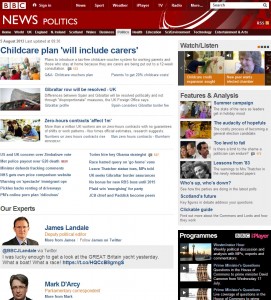The BBC and the Invisibility of Labour
Posted by Professor Justin Lewis

One of the standing jokes on BBC Radio 4’s The News Quiz revolves around Ed Miliband’s low profile and, by implication, ineffective leadership. The same could be said for most of the Labour Shadow cabinet, who have achieved a level of obscurity few previous opposition parties could match. I recently quizzed a group of friends – who are generally politically informed – and all of them struggled to get much further than Ed Balls.
And yet visit the Labour Party’s website and you’ll see a daily outpouring of messages from Miliband and his team. How effective or insightful these interventions are is not the issue: the truth is that the Coalition government are dominating media coverage in a way that few other governments have done.
For the press, who have reverted to a traditional Tory bias, this is not surprising. But our main broadcasters – bound by regulation to be impartial – have also become noticeably unbalanced. This was confirmed by recent research carried out for the BBC Trust by my colleagues, who compared the coverage given by the BBC to the main political parties in 2007 and 2012.
BBC Trust review of the breadth of opinion reflected in the BBC’s output
The research found that the party in government get the largest share of the limelight (as we might expect), but when the Conservatives were in opposition they were given significantly more media time than Labour do now. In 2007 the margin between the Labour Government and Conservative opposition was less than 2 to 1. The margin in 2012 favoured Cameron over Miliband by more than 3 to 1, with a ratio of more than 4 to 1 between Government and Shadow Ministers.
BBC Breadth of Opinion Review – Content Analysis
Some might claim that the Conservatives were a more effective opposition that Labour are now. But this is a subjective judgment for viewers and listeners to make – not for an impartial broadcaster to assume.
So why are the BBC weighting their coverage towards the Government? The answer, I suspect, concerns one of the political realities few are prepared to acknowledge, let alone discuss.
The BBC have certainly had their run-ins with Labour, but the Labour Party has generally been committed to protecting public service broadcasting and, by implication, the BBC. While many Conservatives are also supporters of the BBC (from whom they receive copious amounts of airtime), there has always been a strand of Conservative Party thought that has been more antagonistic, preferring a US-style commercial model as a matter of ideological principle.
This Conservatives (like the Republicans in the US) have also been much more aggressive than Labour– usually with very little evidence – in attacking the BBC for being biased against them. Indeed, the failure of Labour to complain about its lack of coverage is a case in point.
It is not surprising, in this political climate, if the BBC are more fearful of criticism from the right than from the left. Like any risk-averse organisation, they are more likely to want to placate those that threaten them than those that do not. When I discuss this with friends who work for the Corporation, many admit that it rings true.
There was a time when parity between the main political parties could be assumed – inscribed into our broadcasters DNA. Perhaps it is time to look more closely at this most basic assumption.

